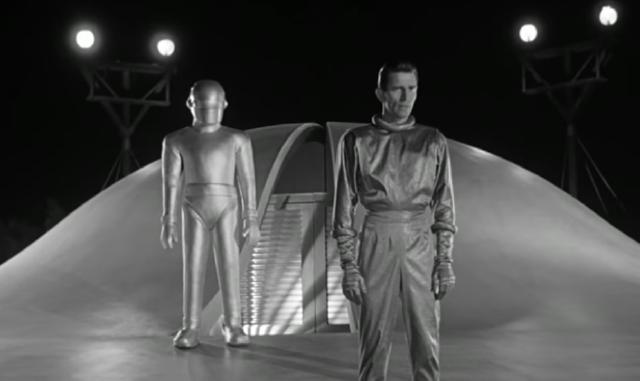DeLoggio Achievement Program
Selection of and Preparation for College and Professional Programs
Culture by Cinema
Anti-Nuclear
The films in the section on 1950s isolationism often carried a subtext that this was not the way America should be; but none of them offered an alternative to the global hostility left behind after World War II. The first two films in this section go further in offering solutions to escalating global hostility: they explicitly suggest de-escalation.
The Day The Earth Stood Still
"The Day The Earth Stood Still" was originally touted as a science-fiction flying saucer and spaceman adventure. It's not until the last scene of the movie that the Galactic police send the message to planet Earth: get your act together, or else.
Twenty years ago, I may have thought this movie was too dated to include on any list. But as I compile this list, we are watching Donald Trump threaten, escalate, de-escalate, change his mind, to the point where a number of nations seem willing to call his bluff. So Klaatu's flying saucer may not match anything that Steven Spielberg can create, but the message is as important today as it was in 1951.
Shoes of the Fisherman
Anything written about the Catholic Church in these days threatens to be the brunt of jokes, but the message of this movie – the first one to treat China as the third superpower – is more relevant today than it actually was when the film was made.
In 1968, the film was not intended to be reflective of any actual history, but several parts of it have come to pass.
It may be based in part on the life of Walter Joseph Ciszek, S.J. (November 4, 1904 – December 8, 1984) was a Polish-American Jesuit priest who conducted clandestine missionary work in the Soviet Union between 1939 and 1963. "Ciszek left Russia in 1963 as part of a "spy-swap" after 15 years' imprisonment and hard labor, making the sign of the cross through the plane window as he flew out of Moscow, the spires of the Kremlin in the distance."
The historic meeting among the Pope, the Chinese chairman, and the head of the Soviet Union never happened, of course. But the recognition of China as a rising superpower, forced by starvation and growing population to take drastic measures, is a more realistic threat now than it was when the movie was made.
The final message of the movie – that Christian charity matters more than faith – fell on welcome ears at the beginning of the antiwar, Civil Rights, and feminist movements.
The second two focus on a different aspect of nuclear power – that used to create electricity. Both "Silkwood" and "The China Syndrome" received very bad press when they were released, being accused of overly dramatic attempts to create an issue where there was none. However, the nuclear reactor failures at Three Mile Island, PA and in Chernobyl, USSR inadvertently made these films box office successes. "Silkwood" focuses on the risks of cutting standards in the construction of a nuclear reactor; "The China Syndrome" focuses on the results of not taking an "incident" seriously. Both bear the message that we have learned to ignore: people in financial and political power will do whatever they can to hide their mistakes and the damage they've caused.
Silkwood
[Karen] Silkwood was a nuclear whistle blower and a labor union activist who died in a car collision while investigating alleged wrongdoing at the Kerr-McGee plutonium plant where she worked. Aside from the superb acting which helped to garner it five Oscar nominations, the film is one of many to contribute to conspiracy theories surrounding the failure of the NRC (Nuclear Regulatory Commission) to do its job and the consequences of being a whistle blower.
For those who think that Silkwood is a fiction, these are the first three causes of the Chernobyl accident, as reported by IAEA Nuclear Safety Advisory Group (INSAG) in 1992:
- The plant was not designed to safety standards in effect and incorporated unsafe features
- "Inadequate safety analysis" was performed[28]
- There was "insufficient attention to independent safety review"[28]
The threat of nuclear catastrophe has been downplayed as our sources of energy are being replaced by windmill farms, solar energy, and allegedly safe disposal of nuclear waste. But the 2011 Fukushima Daiichi nuclear disaster in Japan has commanded the focus of people who still follow anti-nuclear policies. Seven years after the accident, the radiation at Ground Zero was so high that it was "killing" robots that were designed to replace humans in the contamination zone. And cleanup of contaminated water that is being stored off-site is expected to take another 40 years.
The China Syndrome
When "The China Syndrome" was released, it was seen as another of Jane Fonda's "causes," much as many global warming protesters are considered now. Had it not been almost perfectly matched by the accident at Three mile Island and the attempts to cover up the water spill, it would be getting about as much attention as "The Day the Earth Stood Still." But reality and fiction matched too closely in time and circumstances for the film to be ignored.
Many countries are phasing out their nuclear reactors in favor of alternative sources of energy. But the secondary message, that corporate profit will outweigh the safety of the population, is replaying itself in questions of global warming in this decade.
| Copyright | Take me to Home Page |



